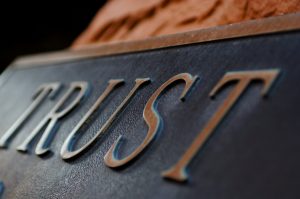Trust
by Whit Sasser
“If a man gives to his neighbor a donkey or an ox or a sheep or any beast to keep safe, and it dies or is injured or is driven away, without anyone seeing it, an oath by the Lord shall be between them both to see whether or not he has put his hand to his neighbor's property. The owner shall accept the oath, and he shall not make restitution.” (Exodus 22:10-11)
 In a culture where truth is seen as relative, it is difficult at times to take others at their word. When the very nature of truth is in question, how shall we believe anyone? No one wants to be gullible. Yet consider what the Lord expected of His people. If one makes an oath that he did not, in this case, harm his neighbor’s property, then that was enough. The man’s word was to be accepted. No further action was required.
In a culture where truth is seen as relative, it is difficult at times to take others at their word. When the very nature of truth is in question, how shall we believe anyone? No one wants to be gullible. Yet consider what the Lord expected of His people. If one makes an oath that he did not, in this case, harm his neighbor’s property, then that was enough. The man’s word was to be accepted. No further action was required.
Among Christians especially, we know we are to be people of our word (James 5:12), and we are also to be people of love who bear, believe, hope, and endure all things (I Corinthians 13:7). Start with the best assumptions. Believe the best of another. Assume the person is telling the truth. Don’t be so suspicious of everyone. This is difficult because cynicism has become so ingrained in our culture.
This doesn’t mean we are to be gullible, but it does mean we may be vulnerable and we can get hurt. The problem is that we can let how one person hurt us bleed over into other relations so that we trust no one. This can turn us into angry, bitter people who no longer know how to love. God does not want that for us.
There is no way to have loving relationships and fellowship if we are not willing to show trust. In a fellowship of believers, especially, we ought to be trusting and willing to assume the best of our brothers and sisters. A yes means yes, a no means no, and those words ought to be sufficient for us.
